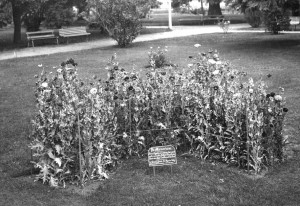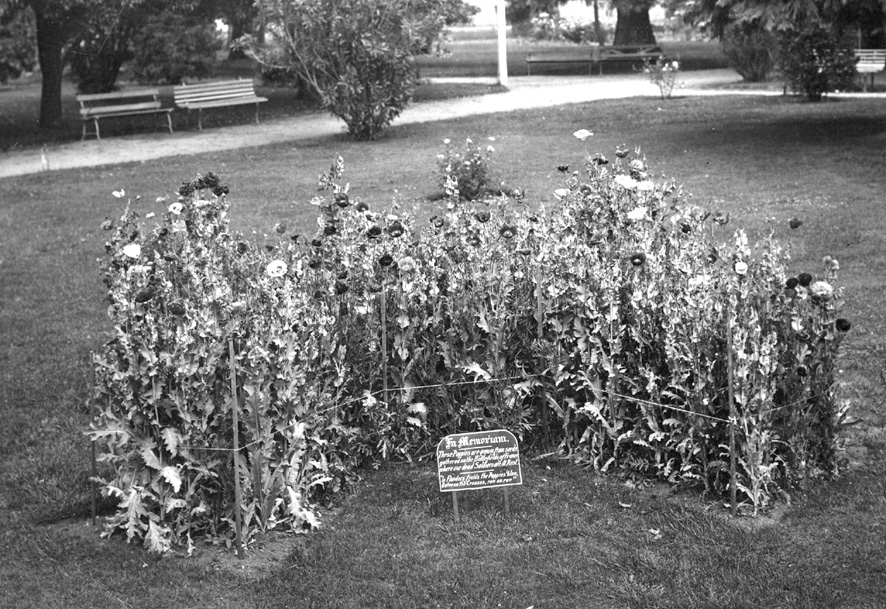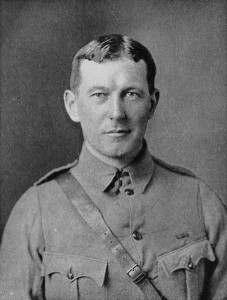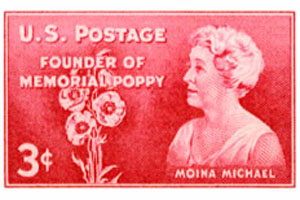
Poppy bed in the form of a Maltese Cross at Cook Park, Orange, c1920, in memory of fallen soldiers. The poppies were grown from seeds gathered from French battlefields and were supplied by the director of the Botanic Gardens in Sydney. Image courtesy Orange City Library.
This year 11 November marks the 96th anniversary of the Armistice which ended the First World War. On the 11th hour of the 11th day of the 11th month the nation stops and Australians unite to observe one minute’s silence in memory of those who have fallen in war.
Since the end of the First World War the Flanders poppy – Papaver rhoeas – has been associated with Remembrance Day. This vivid red flower has become synonymous with the great loss of life in war and is an internationally recognised symbol of remembrance. The poppy first emerged as a symbol of remembrance following the publication of John McCrae’s poem ‘In Flanders Fields’.
Lieutenant-Colonel John McCrae went to France in WWI as a surgeon with the first Canadian contingent. After spending a harrowing seventeen days treating injured men in the Ypres Salient McCrae declared it to be:
Seventeen days of Hades! At the end of the first day if anyone had told us we had to spend seventeen days there, we would have folded our hands and said it could not have been done.
On 2 May 1915 a good friend of McCrae’s, Alexis Helmer from Ottawa, was killed by a shell burst in the Second Battle of Ypres. In the absence of a chaplain Lieutenant-Colonel McCrae presided over the funeral of his friend and former student. The following day McCrae was taking a rest break, seated on the back of an ambulance parked alongside the cemetery where Helmer was buried. The sight of wild poppies blowing gently in the breeze inspired McCrae to compose fifteen lines of verse. Dissatisfied with his poem, McCrae threw it away, but a fellow officer retrieved it and forwarded it to The Spectator in London, where it was rejected. The British Punch, however, published the poem ‘In Flanders Fields’ on 8 December 1915.
McCrae would later became a casualty of the war, falling ill with pneumonia, then meningitis. He died in January 1918 and was buried with full military honours at the Wimereaux Cemetery in France. His poem, however, has endured as a symbol of the sacrifice of those who fought during the First World War, becoming one of the most popular and most quoted poems from that period.
‘In Flanders Fields’ became famous in the United States; with several poets composing epilogues or replies. One such poet was the professor and humanitarian Moina Belle Michael who wrote ‘We Shall Keep the Faith’ in November 1918. In her poem Michael proposed that the red poppy be worn as a symbol of remembrance for those who had died during the war:
And now the Torch and Poppy Red, We wear in honor of our dead.
When the United States entered the First World War Professor Michael took a leave of absence from her position at the University of Georgia to offer her services as a volunteer with the New York-based training headquarters for overseas YWCA workers. On 9 November 1918, just two days before the signing of the armistice, Michael was on duty at the YMCA headquarters in New York, where the 25th Conference of the Overseas YMCA War Secretaries was in progress. Three conference delegates presented her with $10 in appreciation of the effort she had made in decorating the venue with flowers at her own expense. Michael bought 25 red silk poppies and she and her secretaries became the first people to honour the war dead by wearing poppies. Moina Michael later became known as “The Poppy Lady”; in 1948, four years after her death, the U.S. Postal Service issued a commemorative stamp honouring her life’s achievement.
In 1920 Anna Guerin, Secretary to the French YMCA branch, took Moina Michael’s concept of the poppy as a symbol of remembrance further, suggesting that artificial poppies be manufactured and sold to raise money to assist French victims of the war, in particular orphaned children. In 1921 Guerin travelled to Australia, New Zealand, Canada and Britain to promote the Memorial Poppy.
The Returned Sailors and Soldiers Imperial League of Australia (the forerunner to the RSL) resolved that from 11th November 1921 the red Memorial Poppy would to be worn on Armistice Day in Australia. In 1921 the League announced:
The Returned Sailors and Soldiers Imperial League of Australia and other Returned Soldiers Organisations throughout the British Empire and Allied Countries have passed resolutions at their international conventions to recognise the Poppy of Flanders’ Fields as the international memorial flower to be worn on the anniversary of Armistice Day.
That year the American and French Childrens’ League sent a million silk poppies to Australia for the Armistice Day commemoration. The Returned Soldiers and Sailors Imperial League sold poppies for one shilling each; five pennies were donated to a charity for French children; six pennies went to the League’s own welfare work, and one penny went to the League’s national coffers.
Since that time the red poppy has been worn on the anniversary of Armistice in Australia, an enduring symbol of remembrance to commemorate our war dead.
In Flanders Fields by John McCrae
In Flanders fields the poppies blow
Between the crosses, row on row,
That mark our place; and in the sky
The larks, still bravely singing, fly
Scarce heard amidst the guns below.
We are the Dead. Short days ago
We lived, felt dawn, saw sunset glow,
Loved, and were loved, and now we lie
In Flanders fields.
Take up our quarrel with the foe:
To you from failing hands we throw
The torch; be yours to hold it high.
If ye break faith with us who die
We shall not sleep, though poppies grow
In Flanders fields.
We Shall Keep the Faith by Moina Belle Michael
Oh! you who sleep in Flanders Fields,
Sleep sweet – to rise anew!
We caught the torch you threw
And holding high, we keep the Faith
With All who died.
We cherish, too, the poppy red
That grows on fields where valor led;
It seems to signal to the skies
That blood of heroes never dies,
But lends a lustre to the red
Of the flower that blooms above the dead
In Flanders Fields.
And now the Torch and Poppy Red
We wear in honor of our dead.
Fear not that ye have died for naught;
We’ll teach the lesson that ye wrought.



